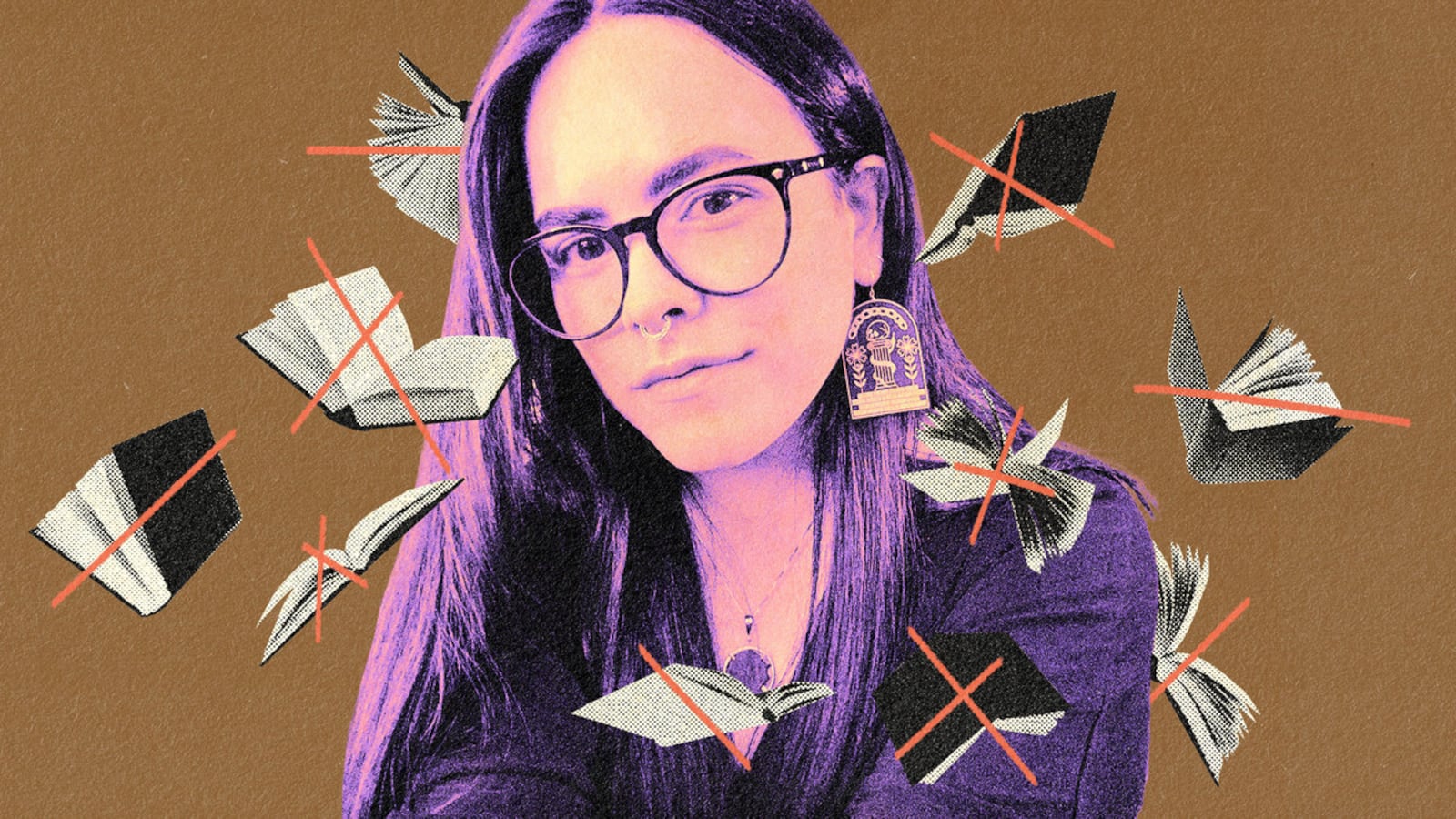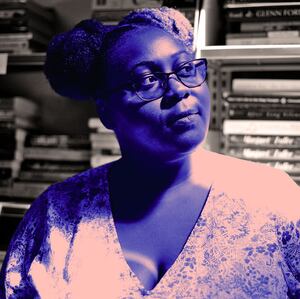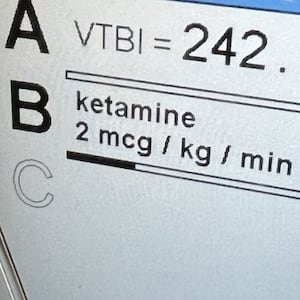Content warning: This story deals with severe mental illness and substance abuse.
A white author who came under fire in the publishing industry for review-bombing writers of color has finally spoken out about the allegations, and vows that she is not racist.
In an exclusive interview with The Daily Beast, Cait Corrain said that a psychotic breakdown—prompted by substance abuse—led to a series of uncharacteristic actions that were beyond her control, including writing scathing Goodreads reviews for books that were rated higher than hers. It was a “sheer, awful coincidence” that the majority of those books were by writers of color.
“I want to just be extraordinarily clear that race had absolutely nothing to do with the authors that I chose to go after,” Corrain said. “The fact that there were a large number of people of color amongst the authors that I targeted is an unfortunate coincidence that happened because I was going off of Goodreads lists. That was the only driver, and I am so distressed and heartbroken by the fact that the impression that people have of me now is that I am a racist.”
As previously reported by The Daily Beast, Corrain, 33, started trending within sci-fi and fantasy communities on social media in December after TikToker Xiran Jay Zhao, the author of Iron Widow, posted about a trend of negative reviews bombarding writers of color on the book website Goodreads. After attempts to place the blame elsewhere, Corrain eventually came clean and apologized for her nasty reviews.
“A sincere apology. I know this is long, but that’s because I’m trying to own and openly address every aspect of what I did,” Corrain wrote on both Instagram and X, the platform formerly known as Twitter, on Dec. 12.
Corrain explained that she had been battling serious depression and substance abuse, without fully going into detail. However, she did post that a change in medication drove her to a “complete psychological breakdown” and the negative reviews were a result.
Nonetheless, writers and fans of the indie sci-fi and fantasy literary community did not buy her reasoning. Authors of color were especially impacted by the reviews, with some saying they had to create new Goodreads accounts because their book rankings had been demolished. They said the negative reviews set them back in a corner of an industry that was already slow and not the most receptive to fantasy stories about people of color, and Black people specifically.
Following the incident, Corrain’s agent, publisher, and book distributor all dropped her as a client. She told The Daily Beast that her publisher didn’t contact her before making a public statement and learned she had been fired after reading a news headline.
“I understand how difficult the publishing industry is to navigate when you are marginalized,” Corrain told The Daily Beast, adding that she is a Jewish neurodivergent person. She seemingly understood and empathized with how much of a professional setback the negative reviews would cost Black authors.
“Especially for people of color, there is another really serious layer on top of that, that I don’t have to deal with,” she said. “And so, the fact that my actions impacted other marginalized people—and specifically a lot of people of color—in such an awful way, just breaks my heart. And I would rather live and admit to a very frightening truth than allow myself to be defined by such an awful harmful misconception. And by harmful, I don’t just mean harmful to me. I mean, harmful in retrospect, to my friends of color, who are now left thinking that this whole time I was harboring this deep, dark hatred for them.”
Corrain, explained that she comes from a family that has battled “serious mental illness” and where “addiction runs rampant.” She was diagnosed with dyslexia and attention-deficit/hyperactivity disorder (ADHD) when she was a child, but didn’t realize that she had autism until January 2022.
“I had spent my entire adult life struggling with the challenge of being autistic in a world that seems designed to punish autistic people for existing and, because I am what people would consider pretty high-functioning, it meant that a lot of these struggles seemed really unreasonable to other people in my life,” Corrain said.
In June 2022, Corrain said that she began experiencing major mental health issues while working on her novel Crown of Starlight. As a neurodivergent person, she said the publisher’s editing notes put her in a state of panic along with increasing feelings of self-doubt due to all of the “visual noise.”
“Some of it was also caused by increasing social isolation, and I started trying to self-medicate during that time with alcohol and marijuana,” she said. “Then, I had a seriously bad reaction to mixing those things with the really high doses of psychoactive medication that I was on.”
On top of self-medicating and her daily dose of ADHD medication and mood stabilizers, Corrain began doing IV ketamine treatments for depression.
“That is a hallucinogenic that really started destabilizing my sense of reality,” Corrain explained. “As the last year and a half progressed, I was using higher and higher doses of it even though I was aware that it wasn’t helping. All it was doing was giving me, like, an hour of disconnection from how bad I felt.”
Corrain said she purposely told her doctor that she needed higher doses of medication to help with her depression, even though she knew she wasn’t progressing. Throughout the year, she misread social cues more and her suicide ideations worsened. Corrain’s concerns about being inferior to peers who did not have accessibility issues deepened.
“I developed this deep insecurity that my… my editors and my agent were looking down on me… that they thought I was being difficult and that I was a failure because I couldn’t do what abled authors could apparently do with no problem,” Corrain told The Daily Beast.
“I became increasingly paranoid that I was being set up to fail. … By that point, I was starting to experience what’s called a medically-induced psychotic break. And psychosis is when you are completely disconnected from reality. And so the logic of all of this, if it doesn’t make sense to you, it’s because it doesn’t make sense—period—to anybody who is not in it.
“I was in such a horrible mental state and I just wanted to die but nobody could understand why I was feeling like this.”
In June 2023, Corrain tried a new ADHD medication and said that was when she created her first Goodreads account and wrote negative reviews—against her will.
“I woke up the next morning, I had this awful, like, dread in my stomach,” she said. “And I couldn’t tell anyone because I was absolutely convinced that if I told anyone about what had happened and the fact that I had done something that was so incredibly out of character for me, that I was going to be institutionalized.”
But she couldn’t go back and delete the Goodreads profiles because that meant she would have had to confront the truth about not having autonomy over her actions.
In November, Corrain said she switched medications again. At that point, she was prescribed a medical cocktail of Zoloft, BuSpar, Vyvanse, Lamictal, Ketamine and Trazodone—all of high doses. Independently, she was consuming cannabis, alcohol, and caffeine. Corrain reiterated that her psychiatrist was not being negligent, but that she was lying about what she actually needed so she could “medicate everything away that was happening.” She wanted a solution to make that internal mental pain disappear.
“I just wanted to die, but nobody could understand why I was feeling like this and they kept telling me how good things were,” Corrain said. “I think on a subconscious level, I just wanted to burn my entire life down so that when I died, people would understand why. And on an even deeper level, I think that I was trying very hard to leave myself no out, to make it so that I had absolutely nothing left. So now, I had to die.”
At the beginning of December, Corrain was experiencing such intense inner turmoil and paranoid delusions about failure that she targeted Goodreads sci-fi and fantasy writers whose books were ranked higher than hers in popularity.
“They were people that I was perceiving as competition in this really altered state,” she explained, though she pushed that mental illness is not an excuse for her actions. “This was not a story about me going on a racist rampage. This was a story about a really insane attempt to make it look like none of my competitors were nearly as popular as I was.”
Unfortunately, she also experienced blackouts during her manic episodes and didn’t have a “clear memory” about what she had done. She wanted to destroy her life so much that she wouldn’t have a reason to not commit suicide, she said.
“It wasn’t until it was too late that I realized that I didn’t actually want to die.”
And it just so happened that writers of color were largely the victims of what she called a “perfect storm” of intense self-doubt and improper prescription dosages.
“I think that [the authors that I actually targeted] are allowed to be as angry with me as they want to be. I think that I hurt them in a way that if somebody had hurt me like that, that I don't know what I would do with that level of anger. I do not want to invalidate their pain, their anger, their feelings because I think that would be completely inappropriate for me to do.”
Corrain decided to come clean when she realized how much control she was losing with herself. She posted public apologies online and then stepped away from social media because she was afraid of what she could have done to herself if she read negative comments about what had happened.
“It is important to me that there are no more lies and secrets and that I'm not trying to hide the truth because all that did was cause a lot of harm to myself and others,” Corrain said. “I think that in losing everything, I realized how much I've actually had.”
Corrain said she deserved for her agent, publisher, and distributor to let her go.
After the indie literary world hit the fan, Corrain checked into an in-patient psychiatric facility to regain a sense of control. She said it was the same day that actor Matthew Perry’s autopsy report was released.
“What I started to realize is that the way we talk about addiction in our society, a dead addict is a tragedy. A living addict is weak and a problem and somebody who just can't get themselves together, and I think that's a huge, huge disservice to the millions of people who are struggling with this stuff because it is an epidemic at this point,” Corrain told The Daily Beast. “I want to try and change the conversation around mental illness, around addiction, and around what it actually is like to be in the publishing industry as a first-time author, as a disabled author.”
Corrain has since changed medications, takes the doses she’s been prescribed, goes to therapy, and completely eliminated cannabis and alcohol from her consumption routine.
But she can’t totally undo the damage that has been done.
She said she understands that she has a privilege over writers of color, who have been set back after being review-bombed. Corrain said white people within the publishing industry need to do more to uplift voices of color and be cognizant of the struggles they endure. She wants to apologize to all of the authors who have been affected by her negative reviews, but at this point she’s been blocked and doesn’t know how to reach them.
“I do want to make sure that I apologize directly to the people that I’ve hurt,” she said. “It felt unacceptable to me to just leave people hanging without any acknowledgement that I knew what I had done and that they deserved to have their pain acknowledged and that I had to own that.”










